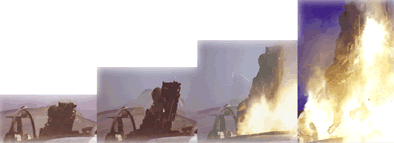Where Industry and Security Intersect
What's New | Sitemap | Search



National Security Assessment of the Emergency Aircraft Ejection Seat Sector
The U.S. Department of Commerce, Bureau of Export Administration (BXA) conducted this national security assessment of the emergency aircraft ejection seat sector at the request of the U.S. Department of the Air Force, Crew Systems Directorate of the Armstrong Laboratory at Wright-Patterson Air Force Base in Ohio. The request was in response to Congressional language in H.R. 1530, FY 1996 Defense Authorization Bill, Air Force RDT&E on Aircraft Ejection Seats which stated, "The committee is also concerned about the sustainment of the U.S. (Ejection seat) industrial base during this period of virtually no aircraft production."
BXA is delegated the authority under Section 705 of the Defense Production Act of 1950, as amended, and Executive Order 12656 to gather basic economic and industrial information from the private sector. These provisions enable BXA to perform industry analyses to assess the capabilities of the industrial base to support the national defense and develop policy alternatives to improve the international competitiveness of specific domestic industries and their abilities to meet defense program needs. It is noted that ejection seats enhance the national security by preserving the lives and operational experience of war fighters.
Major reductions in U.S. defense procurement of new combat aircraft in the last decade have severely eroded the market for new ejection seats. The smaller market was attended by a sharp drop in employment and in the specialized expertise required to design and produce ejection seats. The United States is down to one currently active producer (McDonnell Douglas). Based on current projections, the prospects for an expanded market over the next five years are not good. It appears likely that, without cooperative industry-government action, the future market will be forfeited to major foreign concerns.
The rest of the world has also experienced major defense reductions. Revenues and employment declined by about a third for the two major foreign ejection seat producers, the Zvezda Design Bureau in Russia and the Martin-Baker Aircraft Company in the United Kingdom. However, each company is aggressively targeting the U.S. market. For example, Martin-Baker, who by every economic measure is the world's strongest competitor, recently captured the 1,400 ejection seat Joint Primary Aircraft Training System (JPATS) contract. This is the only significant new U.S. ejection seat procurement until forecasted production of the Joint Strike Fighter (JSF) begins around 2008.
However, according to various industry sources Martin-Baker may also be the front-runner for the JSF ejection seat. These same sources report that Martin-Baker seats have been chosen by both Boeing and Lockheed Martin for their Joint Strike Fighter concept demonstrator models. Currently, no U.S. producer has an ejection seat in contention for the JSF, although the U.S. Air Force and Navy are sponsoring an American-Russian joint venture to examine the possible adaptation of Zvezda's K-36D seat to American cockpits. This potentially puts Zvezda's technology in contention for the JSF seat competition. However, no commitment has been made by the JSF Program Office or either of the two contractors now competing to build the aircraft. The JSF will be the major U.S. market for ejection seats, with expected procurement of over 3,000 seats, in the first quarter of the next century.
Historical circumstances greatly influenced the development of a highly fragmented ejection seat industry in the United States, composed of dozens of firms that supply various component parts for the final product. None of the companies has a very large financial stake in ejection seats in relation to their total corporate revenues; the highest is less than 4 percent.
The fragmentation in the U.S. industry, added to the relatively small size of total ejection seat revenues worldwide, leaves the U.S. ejection seat industry poorly structured to compete in world markets. The structure fails to provide the necessary incentives and focus needed for product innovation and improvement. It also levies an added administrative and regulatory burden on the Government, which must periodically inspect, certify, procure from, and coordinate with many more firms.
As part of the assessment process, BXA conducted a survey of firms in the ejection seat sector. Several subcontractors reported that Government regulations impose additional inefficiencies on the industry, such as outdated and difficult to change testing procedures. The Defense Federal Acquisition Regulations contain non-defense related policies that burden the ejection seat industrial base. These programs include the small and minority business set-asides, the Buy American provisions, and the Competitiveness in Contracting Act.
In sharp contrast to the American situation, Martin-Baker is integrated into most areas related to ejection seats, actively seeks to improve the product, and invests in the latest technologies. Ejection seats constitute more than 95 percent of corporate revenues. The firm aggressively markets ejection seats worldwide, has a 75 percent share of the world market, excluding former communist countries, and provides lifetime service for seats in world inventories.
U.S. research and development and qualification testing (RD&T) funding is left largely to the Government. This relates back to the fragmentation of the industry, and is also due to inadequate prices (or value) for ejection seats that discourages private support for RD&T programs. Ejection seats have a perceived lower priority among the various other combat aircraft subsystems (avionics, weapons, engines, etc.), which creates a desire to minimize their costs. Also, there are no commercial markets for ejection seats that could promote greater private efforts.
The major driving forces behind the current RD&T effort are the push toward fourth-generation seat technologies and the increased range of weights and sizes to accommodate female aircrew. Another thrust is for improved stability at higher speeds and improvement in lower-altitude adverse attitude ejections. Currently, portions of the U.S. RD&T funding for this work are directed overseas to Zvezda and Martin-Baker.
The Department of States export controls on military equipment encompass ejection seats and seat components, and thereby limit the competitiveness of U.S. products on the international market. The U.S. Air Force and private industry argue that ejection seats are not weapons and do not belong on the munitions list. The British have established a two-tier control system that makes it easier to export non-lethal military items such as ejection seats. The U.S. State Department controls everything on its munitions list as a weapon system, which makes the licensing process more difficult and time consuming for American firms.
The Boeing takeover of Rockwell and proposed merger with McDonnell Douglas, combined with contractual relationships with the Universal Propulsion Company in Arizona and Zvezda, are positive developments in a move toward consolidation of industry assets. This could present both the U.S. Department of Defense (Air Force and Navy) and industry with an opportunity to revitalize the domestic sector. Such revitalization would strengthen the national security by maintaining U.S. control over leading-edge technology and promote a manufacturing base capable of deploying these advances. An integral part of this revitalization would be the successful development of fourth generation ejection seat technologies and female weight and size accommodation in cooperation with a unified, rationalized, and forward-looking U.S. ejection seat sector.
Additional steps to stimulate the competitiveness of U.S. ejection seat industrial base: